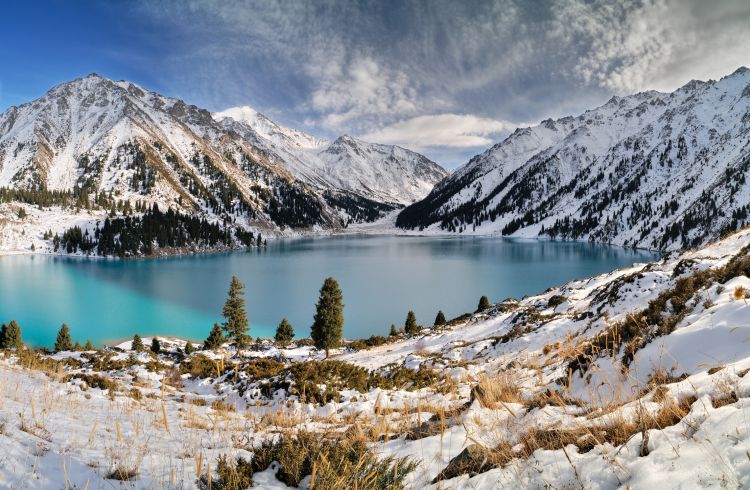How to Stay Healthy While Traveling Around Kazakhstan
Find out how to stay safe in wild weather extremes, avoid food poisoning and which vaccinations you need for your trip to Kazakhstan.
 Photo © Getty Images/humancode
Photo © Getty Images/humancode
Kazakhstan is located in the northern region of Central Asia, and experiences extremely cold winters, which begin in November and last until April. The bitterly frosty winters see temperatures as low as 10ºF (-12ºC). Summer, on the flip side, can reach high temperatures around 86ºF (30ºC).
Natural disasters
In March 2010, the two weather extremes caused tragedy in the mountains near Almaty. Heavy snowfall followed by warm temperatures caused water banks at Kyzyl Agash and Zharbulak water reservoirs to explode.
Major floods followed, killing 35 people and forcing the evacuation of thousands more.
In April 2017, 7,000 people were evacuated after huge floods struck seven regions due to snowmelt, and in March 2018 three days of heavy rain and melting snow in east Kazakhstan caused 400 people to be evacuated and damaged 140 buildings.
Icy conditions in winter weather causes many road accidents in Kazakhstan in addition to avalanches.
Altitude sickness can occur for anyone traveling in the Tien Shan Mountains. Take time to get used to the elevation, as serious cases of AMS can be fatal.
Kazakhstan is located in a seismically active region, and although they are rare, earthquakes can happen. They're most likely to strike in the southeast region, which is quite mountainous, and can affect Almaty.
Other environmental hazards include lead pollution in the region of Shymkent, in the south of Kazakhstan.
Staying healthy in Kazakhstan
A few other natural dangers exist for travelers to Kazakhstan. Anyone roaming the forest regions from spring to fall is at risk for tick bites, which can also carry encephalitis.
There are numerous diseases borne from other insects and water, such as typhoid, rabies, hepatitis and leishmaniasis. Tuberculosis occurs in the Aral Sea and Semipalatinsk regions.
Hemorrhagic fever with renal syndrome has occurred in southern Kazakhstan, including cases that have led to death.
Poliomyelitis is another possible virus passed on between people through feces. Severe instances can cause paralysis in the spinal cord or brain stem.
You can check on information regarding current disease outbreaks by visiting your country's government travel site. See a doctor to get the right advice prior to traveling to find out which booster shots or vaccinations you need for Kazakhstan.
Watch what you eat
Food-borne illnesses are also possible, and several outbreaks occurred in March 2010, including one among workers in Atyrau in western Kazakhstan who ate a type of salad at a cafeteria. The cause was suspected to be poor food preparation processes.
Brucellosis occurs in rural areas where infected meat is consumed. Be cautious when selecting a place to eat shashlik, or shish kebab. Make sure the place you are buying it is busy, with high-turnover of food.
Be careful with Kazakhstan's street food in general, and try to ensure that all meat is properly cooked before eating.
Simple and flexible travel insurance
You can buy at home or while traveling, and claim online from anywhere in the world. With 150+ adventure activities covered and 24/7 emergency assistance.
Get a quote
1 Comment
A Kazakh expat in US here.... food poisoning is more of a concern in US than in Kazakhstan to be honest. Deaths and hospitalizations are pretty common in US from produce grown in California or from chickens raised industrially in massive quantities - more cases in absolute numbers and bad commercially grown meat. Americans on average know no longer how real meat tastes. One word come to Kazakhstan. Make sure you get all vacccinated and cleaned, we don’t need your cooties 🤣